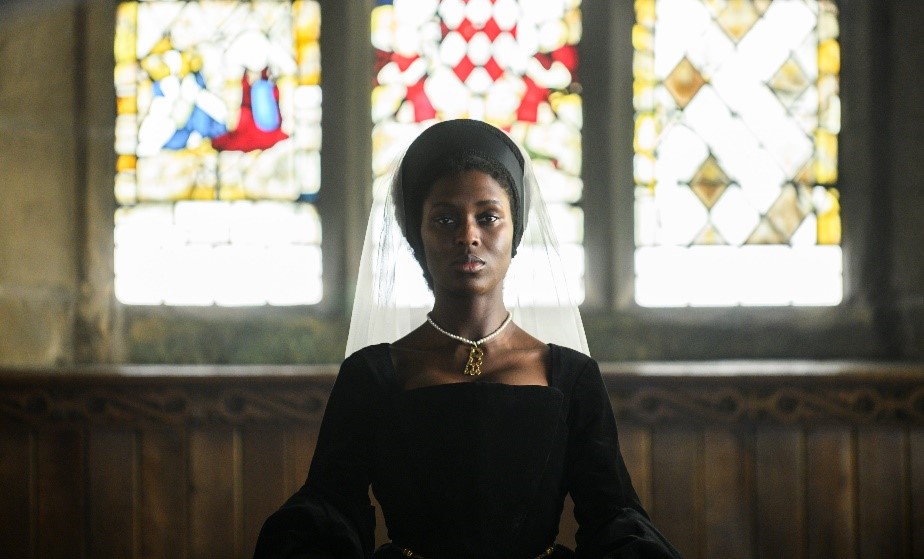Over the past few years, there have been an increased number of historical dramas that employ color-blind, or color-conscious, casting. Sometimes these projects feature people of color yet completely ignore race (“Mary Queen of Scots”), sometimes they clumsily comment on race once before quickly moving on to something else (“Bridgerton”). In contrast, the new three-part miniseries “Anne Boleyn” nimbly utilizes the practice to poignant effect. Jodie Turner-Smith, who is Black, takes on the titular role, a casting move that enhances the narrative, adding new dimension to a story we know by heart.
In case royal history (or pop culture) isn’t your bag, Anne Boleyn was the doomed second wife of Henry VIII. The Queen of England for a little less than three years, she was beheaded in 1536 for “treason” and other charges, but, really, she was executed because she didn’t give birth to a son, ergo she couldn’t secure the king’s line of succession with a male heir. Set during the last five months of her life, “Anne Boleyn” begins with Anne as the most powerful woman in England and ends with her brutal death.
Anne’s Blackness is never explicitly acknowledged in this show, but “Anne Boleyn” trusts its audience to bring their awareness of race and racism to the story. The real Anne Boleyn was not Black, but she was a scapegoat who, toward the end of her life, was ostracized and vilified at court. She was imperious and ambitious, traits that were not necessarily appreciated in a woman. A lot of people resented Boleyn during her rise and celebrated her fall. They hated her because she was a woman who knew her worth, and didn’t hide it; in “Anne Boleyn,” they hate her because she’s a Black woman who doesn’t know her place.
The casting of Turner-Smith throws what Anne Boleyn actually went through into stark relief; the show’s racial inclusivity heightens the overall Anne vs. The World dynamic. When this Henry VIII (Mark Stanley) begins to turn on this Anne, it’s not just the story of a spoiled monarch punishing the woman who believes herself to be his equal: it’s the story of a white man, in a mostly white world, pinning his grievances on a woman of color, knowing full well no one will stop him, or even care.
The sexualized discrediting of Anne Boleyn is also given new depths in this series. The real Boleyn was falsely accused of having several lovers during her marriage to the king as well as engaging in an incestuous relationship with her brother. I have to believe that, as we watch Turner-Smith’s Anne hold her head high while being publicly denounced for her (fake) sexual history, series creator-writer Eve Hedderwick Turner and director Lynsey Miller want us to think of the women throughout history, Black women in particular, who have had their sexualities weaponized against them — whether in a court of law, in private, online, or elsewhere. The real Anne Boleyn got a raw deal and she was a queen, the show seems to be saying, imagine what marginalized or less powerful women have gone through.
In terms of historical detail, “Anne Boleyn” doesn’t really offer anything new. Yet, even with all the previous portrayals of her story, it manages to make the tragedy of Anne Boleyn feel urgent again. Turner-Smith’s Anne is a proud Black woman who thought she had won the game; her husband’s overwhelmingly white court was happy to show her just how wrong she was. This isn’t exactly what happened in Tudor England, but it still rings true.
The first episode of “Anne Boleyn” is now streaming on AMC+. New episodes drop Thursdays.







